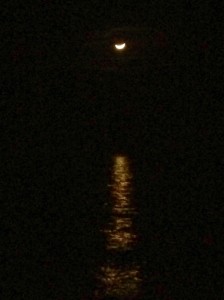The Sweet Darkness
 Dear Friends,
I recently spent a month on the coast in Florida. The light and the warmth there were easy and comfortable. I woke up each morning ready to roll out the door for a walk along the beach with the dogs. I'm back home now, and this morning, it was dark and only 3 degrees F when I headed out for an icy morning dog walking.
Dear Friends,
I recently spent a month on the coast in Florida. The light and the warmth there were easy and comfortable. I woke up each morning ready to roll out the door for a walk along the beach with the dogs. I'm back home now, and this morning, it was dark and only 3 degrees F when I headed out for an icy morning dog walking.
Like most of us, I want everything to be light, easy and "nice." I don't like to have to show up when it's dark and cold. I prefer to hear people's joyful stories, not their pain. When my loved ones are suffering and there's nothing I can do to stop it, I am often afraid to engage with their darkness. Because I am afraid of opening up to my own darkness, I sometimes find myself keeping their pain at a distance.
The Buddhist environmental activist, Joanna Macy, speaks about how difficult it is for us to look at the destruction of the earth, or any other suffering, and how much easier it is to avoid and turn away. If our child or mother was dying of cancer, she says, we might want to turn away, but because we love them, we can't help but be with them, even in deep suffering. If a loved one is in a bad mood, dealing with a difficult breakup, or we ourselves are just cranky, we may want to run away from that darkness too. But out of love, we learn to sit with whatever is. Love inspires in us the courage we need to stay with darkness.
"The mind creates the abyss, the heart crosses it." -- Sri Nisargadatta
We know that the dark is always going to return. The first noble truth of the Buddha was that suffering is inherent in human life. We have our light days and our dark days. Accepting this truth is the first step on the path of mindfulness. Once we see that, we can practice coming in and out of the darkness more fluidly. The same effortless way that days shorten, lengthen, and shorten once again. We are no longer caught by believing that we can only survive in the light. We can love our lives and the world enough to be with even its darkest moments.
When I can sit still with the darkness, my life expands and I find a little more spaciousness. After walking in the dark cold this morning, I was so grateful for the warmth of my house and the coziness of my puppies as they curled up on my lap.
The first time I was in an MRI machine, I had a panic attack. After banging on the inside of the machine and screaming, "Let me out!", I was pulled out and collapsed into sobs. The dark immobility of the machine was too much for me. The next time I had an MRI, I practiced being mindful with the darkness and the fear, and I was able to tolerate it. I was elated when I was rolled out knowing that my capacity to be with my own darkness had been stretched. I think it's like that with all of the dark places in our lives. We can learn to slowly, slowly gain comfort with the places that challenge and scare us.
Many fairy tales, fables, and poems offer us the narrative of entering into the darkness - the most fearful places in ourselves -- and coming back with a renewed sense of who we are. Larger, more courageous, more spacious, and with more clarity of direction.
The poet Rainer Maria Rilke writes about the darkness:
Quiet friend who has come so far, feel how your breathing makes more space around you. Let this darkness be a bell tower and you the bell. As you ring,
what batters you becomes your strength. Move back and forth into the change. What is it like, such intensity of pain? If the drink is bitter, turn yourself to wine.
In this uncontainable night, be the mystery at the crossroads of your senses, the meaning discovered there.
And if the world has ceased to hear you, say to the silent Earth: I flow. To the rushing water, speak: I am. (Part Two, Sonnet XXIX)
Paradoxically, being mindful of our dark places, of our sadness and our fear, is what transforms them. Rilke's sonnet suggests that we hold our darkness with the interested curiosity of mindfulness: "What is it like, such intensity of pain?" When we are able to sit still with our fears, we see them for the scared little boys and girls that they are, rather than the enormous monsters that we imagine them to be. Avoiding the cold, dark places doesn't make them go away, and it doesn't bring us the light we need to grow and transform. Turning toward the darkness, in ourselves and others, brings us into what Buddhist teacher Joan Hailfax calls, "the fruitful darkness."
I remind myself of this as I prepare to brave the dark cold of tonight's dog walking. Giving up my comfort and light, even for this brief walk, is a way of handing myself over to the world as it is. Loving the world and others enough to entrust ourselves to it, even when it isn't all light and happiness, is what it sometimes takes to get a glimpse of who we really are and what we are capable of.
